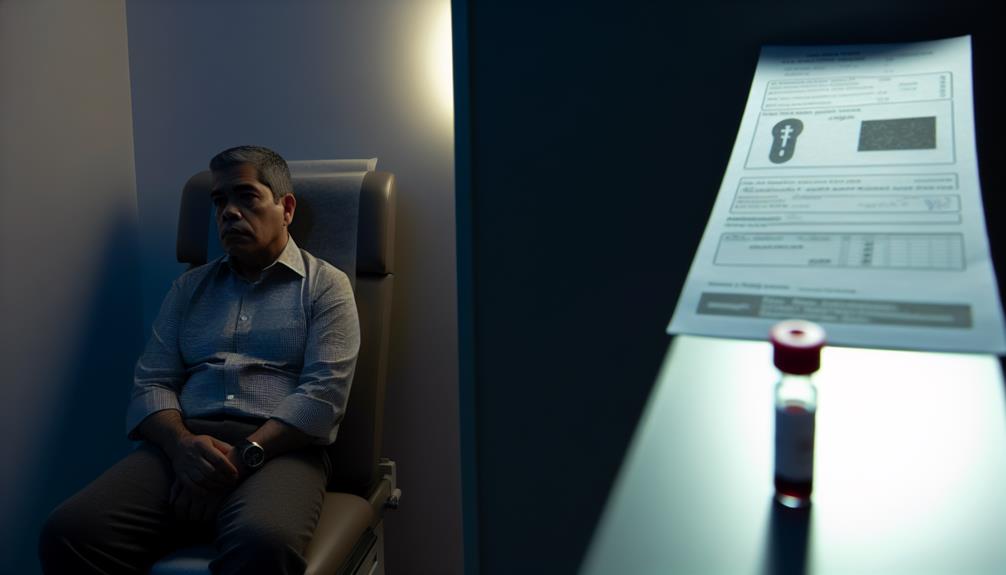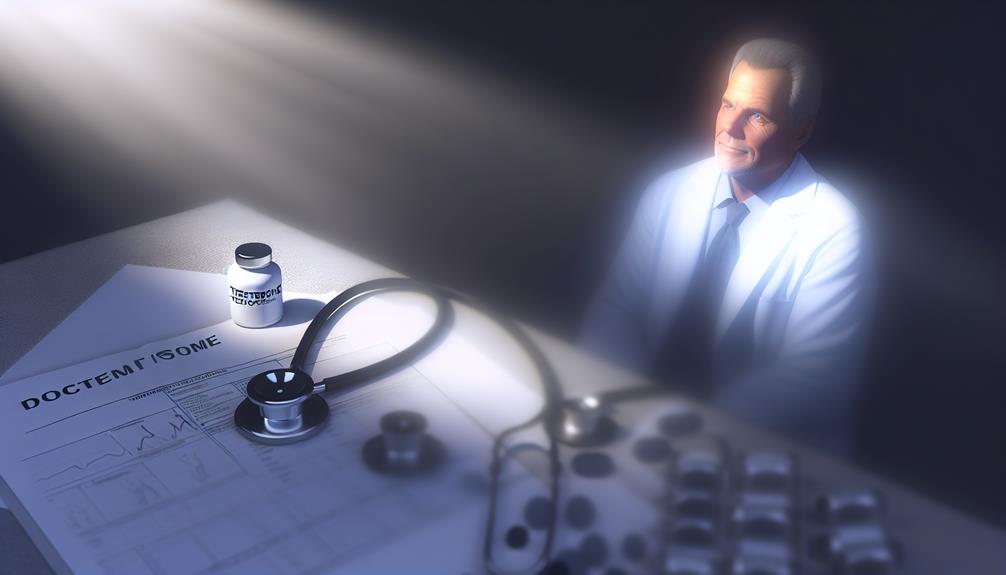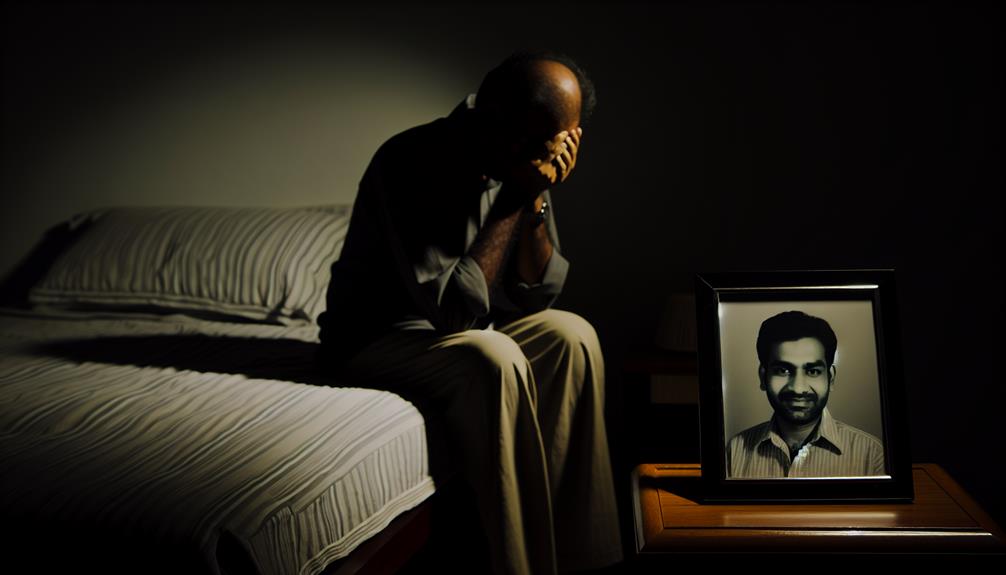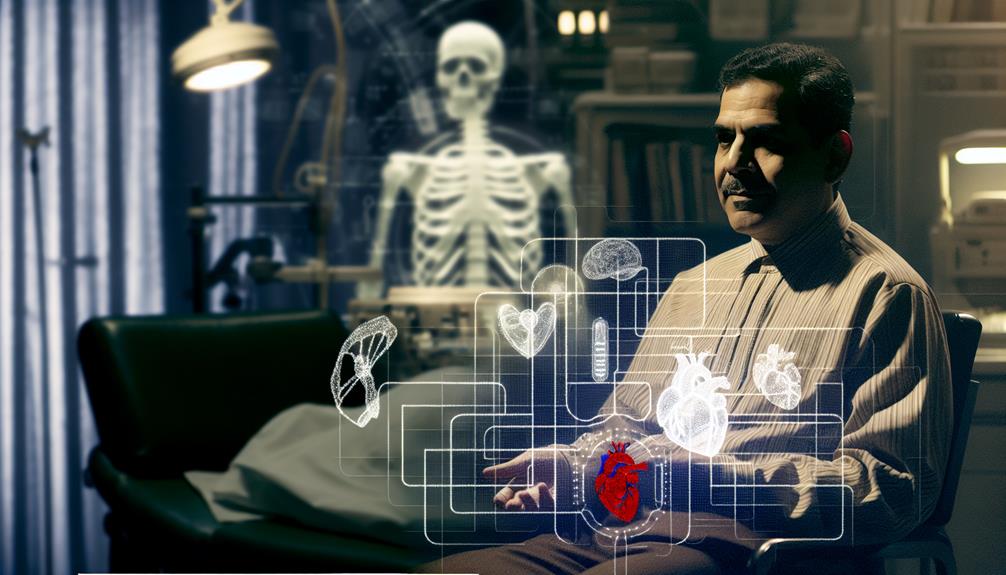Low testosterone can have a profound impact on men's health, affecting physical, emotional, and sexual aspects of life. I've observed that its deficiency reduces muscle mass and bone density, increasing the risk of obesity, diabetes, and cardiovascular diseases. Emotionally, it can lead to mood swings, irritability, and decreased motivation, complicating relationships and daily functioning. Sexual function suffers, resulting in reduced libido and difficulties with erections. In addition, the interplay between these symptoms can create a cycle of health decline. If you want to explore how to address these issues effectively, there's a wealth of information available.
Understanding Low Testosterone

Low testosterone, often referred to as hypogonadism, is a condition characterized by below-normal levels of testosterone, the hormone essential to various bodily functions in men. Understanding this condition requires an analysis of its physiological basis and implications for health. Testosterone plays a significant role in regulating mood, energy, muscle mass, and bone density. When testosterone levels drop, often due to aging or other medical conditions, men may experience hormonal fluctuations that can disrupt these functions.
In my exploration of low testosterone, I've observed that the diagnosis typically involves measuring serum testosterone levels, usually through a blood test conducted in the morning when levels are highest. If diagnosed, many men consider testosterone therapy as a potential treatment option. This therapy aims to restore testosterone levels to a normal range, which may alleviate some of the adverse effects associated with hypogonadism. However, it's essential to approach testosterone therapy with caution, as it can carry risks and side effects, including cardiovascular issues and potential exacerbation of pre-existing conditions.
Moreover, the interplay of hormones in the body is complex. Hormonal fluctuations can occur not only from testosterone levels but also from other hormones like estrogen and cortisol. Consequently, a thorough evaluation by a healthcare professional is vital to determine the underlying causes and appropriate treatment strategies. Understanding low testosterone involves recognizing its multifaceted nature and the broader hormonal context in which it exists, guiding effective management and improving quality of life.
Symptoms of Low Testosterone
When evaluating low testosterone, I often observe a range of symptoms that markedly affect physical health, emotional well-being, and sexual function. These manifestations can include decreased muscle mass, mood fluctuations, and erectile dysfunction, which collectively highlight the profound impact of hormonal imbalance. Understanding these symptoms is essential for addressing the underlying issues and improving overall health outcomes.
Physical Health Effects
Testosterone plays an essential role in maintaining overall physical health, and its deficiency can manifest through various symptoms. I've observed that men with low testosterone often face significant health challenges. The physical effects can be quite debilitating and may include:
- Decreased Muscle Mass: I've noticed a reduction in strength and muscle size, making it harder to maintain an active lifestyle.
- Increased Fat Accumulation: Many men report unwanted weight gain, particularly around the abdomen, which can lead to additional health complications.
- Bone Density Loss: Low testosterone levels can result in weakened bones, increasing the risk of fractures and osteoporosis.
These symptoms highlight the importance of recognizing low testosterone levels. Testosterone therapy or hormone replacement can be effective strategies for addressing these issues. By restoring hormone levels, I've seen improvements in muscle mass, better weight management, and enhanced bone health. It's essential to consult a healthcare provider for a thorough evaluation and to discuss the potential benefits and risks of testosterone therapy. Understanding these physical health effects is critical for men to make informed decisions about their health and well-being.
Emotional Well-being Changes
The impact of diminished testosterone extends beyond physical health, substantially affecting emotional well-being. I've observed that low testosterone levels can lead to significant mood swings, causing fluctuations in emotions that are often unpredictable. This instability can make it difficult to maintain consistent relationships and can alter my perception of daily interactions.
Moreover, I've noticed that my anxiety levels can increase without any clear trigger. Research supports the idea that low testosterone is linked to heightened feelings of anxiety, making it challenging to manage stress effectively. This anxiety is often accompanied by irritability, which can further exacerbate emotional turbulence.
Feeling less motivated or energized is also common, contributing to a sense of apathy towards activities I once enjoyed. It's essential to recognize these emotional symptoms as they can impact overall quality of life. By understanding the connection between testosterone levels and emotional health, we can better address these challenges and seek appropriate interventions.
Sexual Function Issues
Often, men experiencing low testosterone report noticeable changes in sexual function that can greatly affect their quality of life. These changes often manifest as a range of symptoms that are both distressing and complex.
- Erectile Dysfunction: Many men notice difficulty in achieving or maintaining an erection. This isn't just an occasional issue; it can become a persistent problem, leading to frustration and anxiety.
- Libido Fluctuations: I've observed that fluctuations in libido are common. Some days, desire may seem absent entirely, while other days it might be heightened. This unpredictability can strain relationships and diminish overall satisfaction.
- Decreased Orgasm Intensity: When testosterone levels fall, the sensation associated with orgasm may diminish. This reduction can contribute to a decreased sense of fulfillment during sexual activity.
These sexual function issues can lead to significant emotional distress. They often create a cycle of anxiety, impacting self-esteem and further exacerbating the symptoms of low testosterone. Recognizing these symptoms is essential; addressing them can lead to better management of one's overall health and well-being.
Causes of Low Testosterone

Low testosterone can arise from various underlying factors, and understanding these causes is vital for effective diagnosis and treatment. As I explore this topic, I recognize that low testosterone isn't simply a result of aging; it involves a complex interplay of genetic factors, environmental influences, and lifestyle habits.
Aging, for instance, is associated with an age-related decline in testosterone levels, which can be exacerbated by hormonal disorders or nutritional deficiencies. Additionally, certain medications can have detrimental effects on testosterone production, leading to a cascade of health issues. Stress levels play a significant role, too, as chronic stress can disrupt hormone balance, including testosterone.
Obesity is another significant link; excess body fat can alter hormonal pathways, further reducing testosterone. Thyroid function is also important; hypothyroidism may contribute to low testosterone levels, complicating the clinical picture.
Here's a concise table summarizing these causes:
| Category | Examples | Impact |
|---|---|---|
| Genetic Factors | Family history of low T | Increased risk |
| Environmental Influences | Endocrine disruptors | Hormonal imbalance |
| Age Related Decline | Natural decline after 30 | Lower testosterone production |
| Hormonal Disorders | Hypogonadism, thyroid issues | Impaired hormone synthesis |
| Lifestyle Habits | Poor diet, lack of exercise | Increased obesity, low T levels |
Understanding these causes is vital for addressing low testosterone effectively, paving the way for targeted interventions and improved health outcomes.
Effects on Physical Health
Low testosterone levels can greatly impact physical health through a reduction in muscle mass, alterations in fat distribution, and a decrease in bone density. I want to focus on how these changes not only affect physical appearance but also increase the risk of injuries and chronic conditions. Understanding these effects is essential for recognizing the broader implications of low testosterone on overall health and well-being.
Muscle Mass Reduction
Testosterone levels frequently play an essential role in maintaining muscle mass, and when these levels decline, the effects can be significant. As I've observed, reduced testosterone can lead to noticeable changes in physical health, particularly concerning muscle mass reduction. This can hinder my ability to engage effectively in strength training, ultimately affecting overall fitness.
Here are three important aspects to take into account:
- Decreased Muscle Protein Synthesis: Lower testosterone levels impair the body's ability to synthesize muscle proteins, which is critical for muscle growth and repair.
- Impaired Muscle Recovery: With decreased testosterone, I might find that my muscle recovery after workouts is significantly slower, leading to increased fatigue and a higher risk of injury.
- Loss of Muscle Strength: A decline in muscle mass directly correlates with a loss of strength, making it more challenging to perform daily activities and maintain an active lifestyle.
Fat Distribution Changes
As muscle mass declines due to reduced testosterone levels, individuals often notice changes in fat distribution as well. This phenomenon, known as fat redistribution patterns, markedly impacts body composition changes. I've observed that many men experience an increase in visceral fat, which is fat stored around the organs, leading to potential health risks such as cardiovascular disease and metabolic syndrome.
To illustrate this further, consider the following table:
| Fat Distribution Pattern | Impact on Health |
|---|---|
| Increased abdominal fat | Higher risk of diabetes |
| Decreased subcutaneous fat | Loss of protective factors |
| Shift from lean muscle | Metabolic slowdown |
| Altered hormone levels | Emotional and physical effects |
These shifts in fat distribution can also affect self-esteem and overall quality of life. Understanding these body composition changes is essential for addressing the risks associated with low testosterone. Recognizing that these changes aren't just superficial but are linked to considerable health concerns, we can better navigate the implications of low testosterone and explore potential interventions to mitigate these effects.
Bone Density Decrease
A significant consequence of diminished testosterone levels is the decrease in bone density, which can severely impact physical health. This decline not only affects physical strength but also increases the risk of developing osteoporosis, a condition that can lead to fractures and long-term disability. I've observed that men experiencing low testosterone often encounter several essential issues regarding bone health, including:
- Increased Osteoporosis Risk: Lower testosterone levels correlate with a reduction in bone mineral density, making bones more fragile over time.
- Heightened Fracture Incidence: With weakened bones, even minor falls or accidents can result in significant fractures, which may require extensive rehabilitation.
- Impaired Recovery: The body's ability to heal from injuries also diminishes, potentially prolonging recovery times after fractures or other bone-related issues.
Addressing low testosterone is imperative for maintaining bone density and overall physical health. Regular check-ups and appropriate interventions can help mitigate these risks, ensuring that I maintain ideal bone health as I age. Understanding the relationship between testosterone and bone density is essential for effective health management.
Impact on Mental Health

Low testosterone levels can greatly affect mental health, leading to a range of psychological issues. As I've come to understand, the link between testosterone and mental well-being is significant. Low levels can result in cognitive function impairments, affecting memory, attention, and problem-solving abilities. Men often report feeling foggy or unable to concentrate, which can be frustrating and disheartening.
Moreover, mood swings are another common consequence. Testosterone influences neurotransmitter systems, which play a pivotal role in regulating mood. When levels drop, individuals may experience increased irritability, anxiety, or even depressive symptoms. I've seen how these fluctuations can disrupt daily life, making it difficult to maintain relationships or perform at work.
It's also worth noting that the psychological impact can create a vicious cycle. Poor mental health can lead to lifestyle changes, such as reduced physical activity and social withdrawal, further exacerbating testosterone deficiency. This interplay between psychological and physical health highlights the complexity of the issue.
Relationship With Libido
In examining the relationship between low testosterone and libido, I find that decreased sexual desire often correlates with hormonal imbalances. These imbalances not only impact physical health but can also lead to significant psychological effects. Understanding this connection is essential for addressing the broader implications of low testosterone on men's overall well-being.
Decreased Sexual Desire
When testosterone levels decline, many men experience a notable decrease in sexual desire, commonly referred to as libido. This shift can greatly impact relationship dynamics, creating intimacy challenges that may strain partnerships. I've observed that a reduction in libido isn't merely a personal issue; it can ripple through a relationship, affecting both partners' emotional well-being.
Here are three key aspects to reflect on regarding decreased sexual desire:
- Emotional Disconnect: A decline in libido can create feelings of rejection or inadequacy in partners, leading to emotional distance.
- Communication Breakdown: Men may hesitate to discuss their decreased sexual desire, resulting in misunderstandings and unresolved issues, which can exacerbate intimacy challenges.
- Impact on Relationship Satisfaction: A sustained decrease in sexual desire can lead to dissatisfaction in the relationship, prompting partners to seek resolution or, in some cases, contemplate separation.
Understanding the implications of low testosterone on libido is crucial for addressing these challenges. Recognizing that decreased sexual desire can affect both partners allows for a more compassionate and informed approach to steering through the complexities of intimate relationships.
Hormonal Imbalances Explained
Hormonal imbalances can considerably disrupt various bodily functions, and their effects on libido are particularly pronounced. The relationship between hormone regulation and sexual desire is complex, often rooted in the intricate workings of the endocrine system. When testosterone levels decline, it can lead to diminished libido, as testosterone plays an essential role in sexual health and motivation.
To understand this relationship better, I've compiled a table outlining key hormones involved in libido regulation:
| Hormone | Effect on Libido |
|---|---|
| Testosterone | Increases sexual desire |
| Estrogen | Modulates libido in men |
| Dihydrotestosterone (DHT) | Enhances sexual function |
| Cortisol | Excess can decrease libido |
An imbalance in these hormones can disrupt normal endocrine function, leading to a significant impact on sexual desire. For instance, elevated cortisol levels, commonly associated with stress, might inhibit testosterone production, thereby affecting libido. Understanding these dynamics is vital for identifying potential interventions to restore balance and improve overall sexual health.
Psychological Effects Explored
Psychological factors play an essential role in shaping libido, often intertwining with hormonal influences to create a complex landscape of sexual health. Low testosterone levels can greatly impact not only physical attributes but also psychological well-being, leading to a decline in sexual desire. As I've observed, several key psychological effects emerge from this hormonal deficiency:
- Cognitive Function: Reduced testosterone can impair cognitive processes, including memory and concentration, which may distract from sexual thoughts and desires.
- Mood Swings: Fluctuations in mood can manifest in irritability or anxiety, further diminishing libido. The emotional instability often associated with low testosterone creates a barrier to sexual engagement.
- Self-esteem Issues: A decline in self-image related to sexual performance can lead to avoidance of intimacy, compounding feelings of inadequacy.
Together, these factors create a vicious cycle where low libido fosters psychological distress, which in turn exacerbates the impact on testosterone levels. Understanding this interplay is vital for addressing the multifaceted effects of low testosterone on men's health and developing effective treatment strategies.
Influence on Muscle Mass

Low testosterone levels can greatly impact muscle mass, leading to a condition known as sarcopenia, where the body experiences a gradual loss of muscle tissue. As I explore this issue, I can't help but emphasize how important testosterone is for maintaining lean muscle. It plays a significant role in protein synthesis, which is essential for muscle recovery after strength training sessions. Without adequate testosterone, the recovery process slows down markedly, hindering progress and leading to a decline in overall muscle strength.
In my observations, men with low testosterone often struggle to achieve the same gains in muscle mass as their counterparts with normal levels. This disparity can be attributed to a decrease in the body's ability to recover effectively from workouts. When I engage in strength training, I notice that ideal hormone levels enable me to lift heavier weights, leading to muscle hypertrophy. Conversely, with low testosterone, my body feels fatigued more quickly, and I experience prolonged soreness, which ultimately disrupts my training regimen.
Moreover, the reduced motivation and energy levels commonly associated with low testosterone can further exacerbate the issue. It's a cycle that's hard to break; without the drive to engage in strength training, muscle mass continues to dwindle. As a result, addressing low testosterone is essential for anyone looking to maintain or enhance their muscle mass and overall health. Recognizing these effects can help inform treatment options and lifestyle adjustments aimed at mitigating muscle loss.
Connection to Weight Gain
The interplay between testosterone levels and body composition extends beyond muscle mass, greatly influencing weight gain. As I explore this connection, I can't help but notice how low testosterone can disrupt normal weight management processes. When testosterone levels are suboptimal, it can lead to an increase in fat mass and a decrease in lean muscle, which considerably alters body composition.
Here are three critical ways low testosterone impacts weight gain:
- Altered Metabolism: Low testosterone can slow down metabolic rates. A slower metabolism means fewer calories are burned throughout the day, contributing to weight gain.
- Increased Fat Storage: Testosterone plays a role in regulating fat distribution. With lower levels, there's a tendency to accumulate fat, particularly in the abdominal region, which is often associated with higher health risks.
- Decreased Energy Levels: Reduced testosterone often leads to fatigue and decreased energy levels. This can result in a more sedentary lifestyle, further exacerbating weight gain and complicating weight management efforts.
Risk of Chronic Diseases

While many may underestimate the significance of testosterone in overall health, its deficiency is closely linked to an increased risk of chronic diseases. Research indicates that low testosterone levels can exacerbate chronic inflammation and contribute to the development of metabolic syndrome, which is a cluster of conditions that increase the risk of heart disease, stroke, and diabetes.
Here's a concise view of the associations between low testosterone and chronic diseases:
| Chronic Disease | Link to Low Testosterone | Impact on Health |
|---|---|---|
| Obesity | Promotes insulin resistance and fat accumulation | Increases the risk of type 2 diabetes |
| Type 2 Diabetes | Correlates with lower insulin sensitivity | Complicates glycemic control |
| Cardiovascular Disease | Associated with increased inflammation | Elevates risk factors for heart-related issues |
| Osteoporosis | Impairs bone density | Heightens chances of fractures |
| Depression | Linked with hormonal imbalance | Affects overall mental well-being |
This table illustrates how chronic diseases can emerge from low testosterone levels. The interplay between chronic inflammation and metabolic syndrome creates a dangerous cycle, where each condition may aggravate the others. By addressing testosterone deficiencies, we could potentially mitigate these risks. It's essential to recognize the broader implications of testosterone levels on health, beyond just physical fitness or libido.
Cardiovascular Health Concerns
Understanding the implications of low testosterone on cardiovascular health is crucial for men facing this deficiency. Research indicates that low testosterone levels can notably impact heart health, leading to an increased risk of cardiovascular issues. I've found that men with low testosterone may experience changes in their lipid profiles, elevated blood pressure, and even a higher likelihood of heart disease.
Here are three critical concerns regarding low testosterone and cardiovascular health:
- Lipid Imbalance: Low testosterone often correlates with elevated levels of LDL cholesterol and reduced HDL cholesterol, which can contribute to atherosclerosis and subsequent heart disease.
- Blood Pressure Regulation: Testosterone plays a role in vascular function, and a deficiency can lead to increased arterial stiffness. This condition may cause hypertension, further straining the cardiovascular system.
- Metabolic Syndrome Link: Low testosterone is associated with components of metabolic syndrome, including obesity and insulin resistance, which are known risk factors for cardiovascular disease.
For those considering testosterone therapy, it's essential to consult with a healthcare provider to evaluate potential benefits and risks. While testosterone therapy may improve symptoms related to low testosterone, its impact on heart health is still a subject of ongoing research. Understanding these nuances can empower men to make informed decisions about their health and treatment options.
Diagnosing Low Testosterone

Diagnosing low testosterone involves a systematic approach that combines clinical evaluation and laboratory testing. First, I'll start with a thorough assessment of symptoms that may indicate low testosterone levels, such as fatigue, decreased libido, and mood changes. It's vital to gather a detailed medical history and conduct a physical examination to identify any potential underlying conditions that could contribute to hormonal imbalances.
Once I've established a suspicion of low testosterone, testosterone testing becomes the next step. This typically involves measuring total testosterone levels through a blood test. It's important to note that testosterone levels can fluctuate throughout the day, so I usually recommend performing the test in the morning when levels are at their peak. If the results indicate low testosterone, I may suggest further testing to assess free testosterone levels and evaluate other hormones, such as luteinizing hormone (LH) and follicle-stimulating hormone (FSH), to determine the cause of the deficiency.
If low testosterone is confirmed, it's essential to discuss potential implications for treatment options, such as hormone replacement therapy. This approach can help restore testosterone levels and alleviate symptoms, improving overall quality of life. However, before proceeding, I'll make sure that my patient is fully informed about the benefits and risks associated with hormone replacement. Diagnosing low testosterone is a significant first step in managing its impact on men's health, leading to more tailored and effective treatment strategies.
Treatment Options Available
Confirming low testosterone levels opens the door to a variety of treatment options tailored to individual needs. As you explore these options, it's essential to take into account the most effective strategies for testosterone therapy and hormone replacement. Each approach can greatly impact your overall health and well-being.
- Testosterone Injections: This method involves administering testosterone directly into the muscles, typically every one to three weeks. It allows for quick absorption and can effectively increase testosterone levels. However, it may require regular visits to a healthcare provider.
- Transdermal Testosterone: Patches or gels can be applied to the skin, allowing testosterone to be absorbed directly into the bloodstream. This method offers a more consistent hormone level throughout the day and can be easier for those who prefer not to deal with needles.
- Pellet Therapy: Small testosterone pellets can be implanted under the skin, releasing hormones over several months. This option provides a long-term solution, requiring fewer interventions and maintaining stable testosterone levels.
Each of these treatment options carries potential benefits and risks, and the choice may depend on individual health status, preferences, and lifestyle. It's important to have a thorough discussion with your healthcare provider to determine the most appropriate approach to testosterone therapy and hormone replacement. Tailoring the treatment to your specific needs can lead to substantial improvements in your quality of life.
Lifestyle Changes for Improvement

Incorporating specific lifestyle changes can greatly enhance testosterone levels and overall health. First, I've found that dietary adjustments play an essential role; focusing on whole foods rich in healthy fats, proteins, and essential vitamins can improve hormonal balance. Incorporating lean meats, nuts, and leafy greens is beneficial.
Next, I emphasize the importance of exercise routines. Engaging in both resistance training and high-intensity interval training has consistently shown to elevate testosterone levels. I commit to at least 150 minutes of moderate activity weekly.
Stress management is also fundamental. Chronic stress elevates cortisol, which can negatively impact testosterone. I practice mindfulness techniques, such as meditation and deep-breathing exercises, to mitigate stress and maintain emotional stability.
Sleep improvement is another pillar of my approach. I prioritize 7 to 9 hours of quality sleep per night, as inadequate rest can severely disrupt hormonal levels. Establishing a regular sleep schedule and creating a restful environment are key strategies.
I also explore supplement options, such as vitamin D and zinc, which can support testosterone production when dietary intake is insufficient. Additionally, I recognize the significance of hydration strategies; maintaining adequate hydration supports overall bodily functions, including hormonal balance.
Lastly, fostering social support has proven invaluable. Engaging with friends and family can alleviate feelings of isolation, contributing to emotional well-being and lower stress levels. By implementing these lifestyle changes, I'm confident in my ability to enhance testosterone levels and improve overall health.
Frequently Asked Questions
Can Low Testosterone Affect Sleep Patterns in Men?
Absolutely, low testosterone can markedly affect sleep patterns in men. I've observed that when hormonal balance is disrupted, sleep quality often declines. This disruption can lead to insomnia or fragmented sleep, which further impacts overall health and well-being. Research indicates that testosterone plays a role in regulating sleep architecture, and its deficiency may contribute to increased wakefulness during the night. Addressing testosterone levels might improve both hormonal balance and sleep quality.
How Does Age Influence Testosterone Levels in Men?
As I've explored the complexities of testosterone levels, I've noticed that aging effects play a significant role in testosterone decline. It's fascinating how, as we age, our bodies naturally produce less testosterone, often leading to various health issues. This decline can start in the late 30s and continues gradually, impacting muscle mass, mood, and overall vigor. Understanding this relationship helps me appreciate the importance of monitoring testosterone levels as we age.
Are There Natural Supplements to Boost Testosterone Levels?
I've found that several natural supplements can help boost testosterone levels. For instance, herbal remedies like ashwagandha and fenugreek are often recommended for their potential hormonal benefits. Additionally, I've learned that incorporating exercise into my routine offers significant advantages; resistance training, in particular, can elevate testosterone levels. It's essential to approach any supplementation with caution and consult a healthcare professional to guarantee it aligns with my health goals and conditions.
What Role Does Diet Play in Testosterone Production?
Oh sure, let's all just munch on testosterone boosting foods like they're candy! In reality, diet plays a vital role in testosterone production. Foods rich in healthy dietary fats, such as avocados and nuts, can positively influence hormone levels. It's all about balance—too much junk food might sabotage your efforts. I've found that incorporating these foods into my meals really helps support my overall hormonal health. So, let's eat wisely!
Can Stress Impact Testosterone Levels in Men?
I've found that stress greatly impacts testosterone levels in men. When stress hormones like cortisol spike, they can disrupt testosterone regulation within the endocrine system. This imbalance not only affects physical health but also mental health, leading to a vicious cycle. To combat this, I've implemented lifestyle changes such as regular physical activity, which helps mitigate stress and supports hormonal balance, promoting overall well-being.
